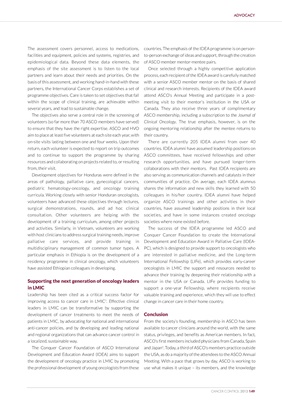
ADVOCACY
The assessment covers personnel, access to medications, countries. The emphasis of the IDEA programme is on person-
facilities and equipment, policies and systems, registries, and to-person exchange of ideas and support, through the creation
epidemiological data. Beyond these data elements, the of ASCO member mentor-mentee pairs.
emphasis of the site assessment is to listen to the local Once selected through a highly competitive application
partners and learn about their needs and priorities. On the process, each recipient of the IDEA award is carefully matched
basis of this assessment, and working hand-in-hand with these with a senior ASCO member mentor on the basis of shared
partners, the International Cancer Corps establishes a set of clinical and research interests. Recipients of the IDEA award
programme objectives. Care is taken to set objectives that fall attend ASCO’s Annual Meeting and participate in a post-
within the scope of clinical training, are achievable within meeting visit to their mentor’s institution in the USA or
several years, and lead to sustainable change. Canada. They also receive three years of complimentary
The objectives also serve a central role in the screening of ASCO membership, including a subscription to the Journal of
volunteers (so far more than 70 ASCO members have served) Clinical Oncology. The true emphasis, however, is on the
to ensure that they have the right expertise. ASCO and HVO ongoing mentoring relationship after the mentee returns to
aim to place at least five volunteers at each site each year, with their country.
on-site visits lasting between one and four weeks. Upon their There are currently 205 IDEA alumni from over 40
return, each volunteer is expected to report on trip outcomes countries. IDEA alumni have assumed leadership positions on
and to continue to support the programme by sharing ASCO committees, have received fellowships and other
resources and collaborating on projects related to, or resulting research opportunities, and have pursued longer-term
from, their visit. collaborations with their mentors. Past IDEA recipients are
Development objectives for Honduras were defined in the also serving as communication channels and catalysts in their
areas of pathology, palliative care, gynecological cancers, communities of practice. On average, each IDEA alumnus
pediatric hematology-oncology, and oncology training shares the information and new skills they learned with 50
curricula. Working closely with senior Honduran oncologists, colleagues in his/her country. IDEA alumni have helped
volunteers have advanced these objectives through lectures, organize ASCO trainings and other activities in their
surgical demonstrations, rounds, and ad hoc clinical countries, have assumed leadership positions in their local
consultation. Other volunteers are helping with the societies, and have in some instances created oncology
development of a training curriculum, among other projects societies where none existed before.
and activities. Similarly, in Vietnam, volunteers are working The success of the IDEA programme led ASCO and
with host clinicians to address surgical training needs, improve Conquer Cancer Foundation to create the International
palliative care services, and provide training in Development and Education Award in Palliative Care (IDEA-
multidisciplinary management of common tumor types. A PC), which is designed to provide support to oncologists who
particular emphasis in Ethiopia is on the development of a are interested in palliative medicine, and the Long-term
residency programme in clinical oncology, which volunteers International Fellowship (LIFe), which provides early-career
have assisted Ethiopian colleagues in developing. oncologists in LMIC the support and resources needed to
advance their training by deepening their relationship with a
Supporting the next generation of oncology leaders mentor in the USA or Canada. LIFe provides funding to
in LMIC support a one-year Fellowship, where recipients receive
Leadership has been cited as a critical success factor for valuable training and experience, which they will use to effect
5
improving access to cancer care in LMIC . Effective clinical change in cancer care in their home country.
leaders in LMIC can be transformative by supporting the
development of cancer treatments to meet the needs of Conclusion
patients in LMIC, by advocating for national and international From the society’s founding, membership in ASCO has been
anti-cancer policies, and by developing and leading national available to cancer clinicians around the world, with the same
and regional organizations that can advance cancer control in status, privileges, and benefits as American members. In fact,
a localized, sustainable way. ASCO’s first members included physicians from Canada, Spain
The Conquer Cancer Foundation of ASCO International and Japan6. Today, a third of ASCO’s members practice outside
Development and Education Award (IDEA) aims to support the USA, as do a majority of the attendees to the ASCO Annual
the development of oncology practice in LMIC by promoting Meeting. With a pace that grows by day, ASCO is working to
the professional development of young oncologists from these use what makes it unique – its members, and the knowledge
CANCER CONTROL 2013 149